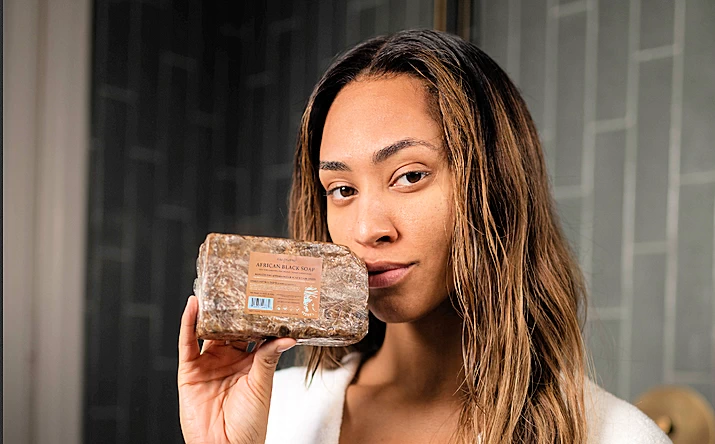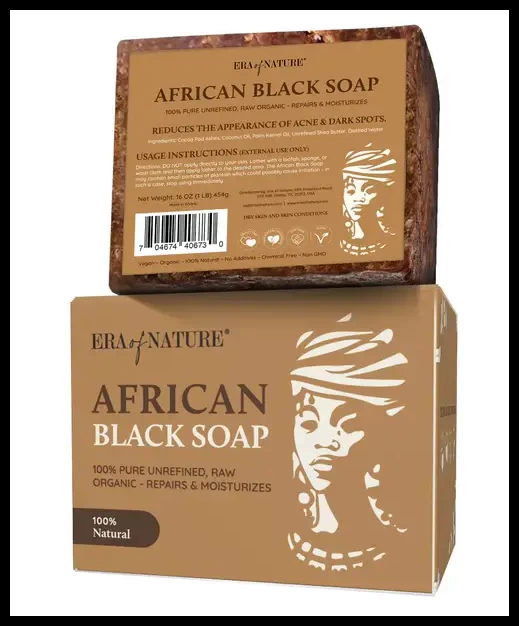
What is African Black Soap? A Natural Skincare Solution
African Black Soap is a traditional skincare product with deep roots in West African culture. Known by various names like Ose Dudu, Alata Samina, and Anago Soap, it has been used for centuries to cleanse, heal, and nourish the skin. Made from simple, plant-based ingredients, this soap is a natural alternative to modern skincare products, offering a range of benefits for all skin types.
Why Choose African Black Soap?
African Black Soap stands out for its 100% natural composition and versatility. Unlike many commercial soaps that contain synthetic additives, African Black Soap is crafted from organic ingredients like unrefined shea butter, plantain skins, cocoa pods, and coconut oil. These ingredients work together to provide deep cleansing, hydration, and healing properties, making it a holistic solution for common skin concerns.
Key Benefits of African Black Soap
- Deep Cleansing: Removes dirt, oil, and impurities without stripping the skin’s natural oils.
- Gentle Exfoliation: The natural texture of the soap helps slough off dead skin cells, promoting a smoother, more even complexion.
- Hydration and Nourishment: Rich in shea butter and coconut oil, it moisturizes and softens the skin, leaving it supple and radiant.
- Acne and Blemish Control: Its antibacterial and anti-fungal properties help reduce acne and fade dark spots.
- Suitable for All Skin Types: Whether you have oily, dry, or sensitive skin, African Black Soap balances your skin’s natural oils without causing irritation.
Where Does African Black Soap Come From?
African Black Soap originates from West Africa, particularly Ghana, where it has been made for generations using traditional methods. Local tribes harvest plant-based ingredients like plantain skins, cocoa pods, and palm oil, which are then combined with shea butter and coconut oil to create the soap. The process is often handcrafted, ensuring the preservation of its natural properties.
By purchasing authentic African Black Soap, you’re not only investing in your skin but also supporting the communities that produce it. Many products are labeled as fair trade, meaning the proceeds go back to the artisans and their families.
How Does African Black Soap Work?
The magic of African Black Soap lies in its natural ingredients, each contributing unique benefits to your skin:
- Plantain Skins: Rich in iron and vitamins A and E, they help exfoliate, heal, and improve skin texture.
- Cocoa Pods: Packed with antioxidants, they repair damaged skin and promote cell renewal.
- Shea Butter: A natural moisturizer that soothes, hydrates, and strengthens the skin barrier.
- Coconut Oil: Provides deep hydration and antibacterial protection.
- Palm Oil: Loaded with vitamins A and E, it nourishes the skin and maintains a youthful glow.
Together, these ingredients create a soap that cleanses, exfoliates, and nourishes, leaving your skin feeling refreshed and rejuvenated.
How to Use African Black Soap
African Black Soap is incredibly versatile and can be used on your face, body, and even hair. Here’s how to incorporate it into your routine:
- Patch Test First: If you have sensitive skin, test the soap on a small area to ensure no adverse reactions.
- Cleansing: Lather the soap in your hands or a washcloth, then gently apply it to your skin. Rinse thoroughly.
- Moisturize: After cleansing, your skin may feel tight. Follow up with a moisturizer to lock in hydration.
- For Hair: Use it as a natural shampoo to cleanse your scalp and hair, removing buildup without harsh chemicals.
Who Can Use African Black Soap?
African Black Soap is safe for all skin types, including sensitive skin. It’s particularly beneficial for those dealing with:
- Acne: Its antibacterial properties help clear breakouts and prevent future ones.
- Eczema and Dermatitis: The natural oils and butters soothe irritation and reduce flakiness.
- Hyper-pigmentation: Regular use can help fade dark spots and even out skin tone.
- Dry or Oily Skin: It balances the skin’s natural oil production, making it suitable for both extremes.
Common Myths About African Black Soap
Despite its popularity, there are some misconceptions about African Black Soap. Let’s clear them up:
- Myth: It’s only for the face.
- Truth: It can be used on the face, body, and hair, making it a versatile addition to your routine.
- Myth: It’s too harsh for sensitive skin.
- Truth: While it deeply cleanses, it’s gentle enough for sensitive skin when used correctly.
- Myth: All African Black Soaps are the same.
- Truth: Authenticity matters. Look for fair-trade, handcrafted options to ensure quality and support local communities.
Tips for First-Time Users
- Start with a patch test to ensure compatibility with your skin.
- If you find the soap drying, mix it with a teaspoon of raw honey or follow up with a moisturizer.
- Use it consistently to see the best results, as its natural ingredients work over time to improve your skin’s health.
Final Thoughts
African Black Soap is more than just a cleanser—it’s a natural, multi-purpose skincare solution rooted in tradition. Whether you’re looking to tackle acne, soothe irritation, or simply achieve healthier skin, this soap offers a gentle yet effective option. By choosing authentic African Black Soap, you’re not only caring for your skin but also supporting the communities that have preserved this timeless remedy.
Ready to transform your skincare routine? Give African Black Soap a try and experience the benefits of nature’s best-kept secret.

